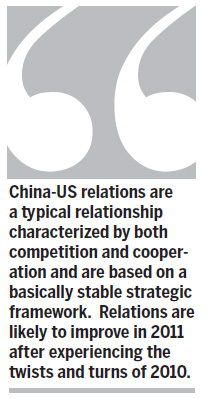Op-Ed Contributors
Changing states of mind
Updated: 2011-01-13 08:02
By Jin Canrong and Kang Xiao (China Daily)
President Hu's visit to US is accompanied by a psychological change in the development of China-US relations
Chinese President Hu Jintao will pay a state visit later this month to Washington where he will hold talks with US President Barack Obama.
The balance of power between China and the United States has undergone significant changes since Hu's first visit in 2006. Now China has surpassed Japan as the world's second-largest economy, while US belief in its own superiority has been undermined by protracted anti-terrorism campaigns, the worst financial crisis since the Great Depression of the 1930s, the polarization of domestic politics and rising dissatisfaction from low-and middle-income groups.
For the first time, China is dealing with a somewhat diffident superpower. This is an important psychological change in the development of China-US ties.
Therefore, the focus of the upcoming visit will be to enhance trust and reduce suspicion at the strategic level, expand common grounds and further promote pragmatic cooperation.
In the field of bilateral relations, what concerns the US the most is how to gain more access to the growing purchasing power of the Chinese market - a major guarantee for achieving the US goal of doubling its exports over the next five years - and China's military modernization drive. Appreciation of the renminbi, intellectual property rights protection and China's policies on encouraging independent innovation and propping up State-owned enterprises will also be raised by Washington.
China is becoming more capable of setting part of the agenda and will voice its own concerns, primarily arms sales to Taiwan and the hazards of trade protectionism. It will urge the US to relax restrictions on China's exports and investment and to expand high-tech exports to China. It will also remind the US that it should take into account its international responsibility while formulating domestic monetary policy and should curb quantitative easing.
Both countries will show solicitude for the prospects of international trade and financial system reform and the two heads of state will talk about the international climate change regime, nuclear non-proliferation, cracking down on transnational crimes, food security and other global issues.
However, although sharing more and more common interests, the two countries still find it difficult to reach a consensus on solutions to many issues, such as the Korean Peninsula and climate change. The existence of differences over a number of specific issues needs both countries to push forward bilateral relations through enhancing trust, clearing up doubts, expanding cooperation and easing contradictions.

China-US relations are a typical relationship characterized by both competition and cooperation and are based on a basically stable strategic framework. Relations are likely to improve in 2011, partly because US domestic politics will trouble China-US relations less, as there are no elections, and because, after experiencing the twists and turns of 2010, both want to work at more pragmatic cooperation.
It is estimated that China will become the world's biggest manufacturer in 2011, ending the 110-year run of the US as number one, something that will undoubtedly have an effect on the psychological basis of Washington's China policy, especially in light of the fact that President Obama has promised to revive US manufacturing.
Obama's concept of "strategic reassurance" is to make sure that China's rise will not pose a threat to the US, but this merely reflects the decline in US confidence, as China will continue to focus its efforts on domestic affairs for a long time to come.
Even if Washington seeks to contain China it will not work. China is now actively engaged as a responsible member of the international community and has closely linked its own destiny with the stability and prosperity of the international community.
The most feasible China policy Washington can employ is to maintain closer contact with China and seek cooperation so as to realize harmonious coexistence and win-win results.
The authors are researchers at the School of International Studies, Renmin University of China.
E-paper

Ear We Go
China and the world set to embrace the merciful, peaceful year of rabbit
Preview of the coming issue
Carrefour finds the going tough in China
Maid to Order
Specials

Mysteries written in blood
Historical records and Caucasian features of locals suggest link with Roman Empire.

Winning Charm
Coastal Yantai banks on little things that matter to grow

New rules to hit property market
The State Council launched a new round of measures to rein in property prices.
